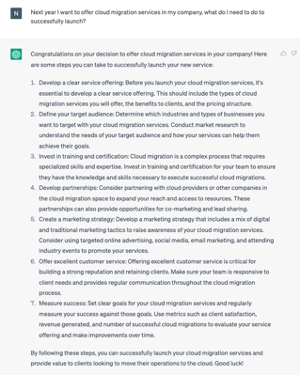My news feed is bombarded with opinions on AI programs like ChatGPT – creatives writing songs and poems, programmers writing or learning SQL, and others automating calculations or macros in Excel with a simple command. Faster and faster the lines are blurring between human and machine. In fact, a study by OpenAI found that its AI-based language model, GPT-3, was able to generate language that was indistinguishable from human-generated language in some cases.
There’s no doubt AI chat has already become a game changer for business across industries. It instantly delivers quick and seemingly personalized responses to questions or requests, making it a popular choice for customer service. But programs like ChatGPT have a much broader potential beyond just customer service… how can leaders and the C-Suite adopt these programs for the good of their companies?
Let’s explore two key themes I believe can positively impact leaders and their organizations.
Communication Sounding Board
One significant advantage of AI-based language models is messaging and the opportunity to improve communication between leaders and employees, customers, and other stakeholders. I don’t mean simply prompting a program and pasting what it spits out. Rather, leveraging the tool to brainstorm – compare messages and approaches to find what will resonate. Beyond just clarity of a message, tools like ChatGPT can help create a tone – the empathy to a communication. Think of it as your personal assistant that can help craft content for you to mold to best fit your organization.
Meaningful Search
It can be a challenge to look outside one’s organization – leadership forums and councils are relatively small compared to the wealth of insight worldwide, after all. Another advantage of AI-based language models is the ability to better understand the world beyond one’s company and act strategically. Think of it like asking all the experts when you don’t know any of the experts.
Let’s look at a very basic example of what this can mean. One of Paradigm’s key practices is focused on Cloud – it’s a well-established arm that continually solves challenges for our clients. But let’s pretend we didn’t already focus on Cloud services and ask ChatGPT the following: “Next year I want to offer cloud migration services in my company, what do I need to do to successfully launch?”.

Instantly the program provided guidance and detailed steps on how to implement this potential new offering. Although much of it is rudimentary, as one subsequently has ChatGPT dive further, the better and better the data gets. The biggest advantage to AI-based language models for meaningful search is the assembly. It isn’t just giving you sources that can support your question (like a Google search). It’s like someone with the experience of a lifetime (up until 2021 of course) has assembled and curated the response. It offers the clarity that gives you a place to start.
Let’s not get ahead of ourselves – these open-source tools aren’t yet fully trustworthy. They are not yet mature enough to handle privacy and complexity, but they can help assemble thoughts and act as a springboard for understanding, communication, and action. There are no doubts tools like ChatGPT or Google Bard will continue to evolve and become more impactful to leaders and their organizations beyond my examples here.

By Chris Gately, Chief Operating Officer & Revenue Officer

